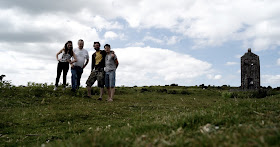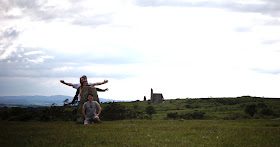In autumn 2014 I moved back to Cornwall, where I spent the
first eighteen years of my life – a place that is still very much my home. My
plan was to lock myself away in the attic and write as much as I could before
spring. Most of what I’ve written has been set over a hundred years ago in the
American West, but a handful of the stories, plays and ideas have gone back to the
routes in my life by the sea.
It was when writing one of these plays, Sirenia, set in a lighthouse off Cornwall, that I started thinking
about Cornish culture, heritage and, most specifically, the Cornish language.
Before last week I spoke only a handful of Cornish words; ‘Kernow’ meaning ‘Cornwall’,
and my old school motto, ‘Fast Yn Mesk Tonnow’ – ‘Firm among the waves’.
Cornish isn’t taught in schools; it’s barely known by more
than a few hundred speakers, but it is a language that is heavily embedded in
Cornish culture, in our names, and our history. The brutal past that surrounds
our former language, Kernowek, is a story well known to all the Celtic nations –
a tale of English fear that turned into a vicious, blood soaked quest to crush a
people’s independence.
There are a handful of people working in Cornwall who are
fighting to bring the language back to life, to ensure Kernow’s past is not buried,
that its culture is not forgotten. I approached one of these people, Pol Hodge,
at the start of 2015 with the idea of developing Sirenia as a play spoken entirely in Cornish. Pol is a writer, poet,
performer and Cornish Bard. His work is ‘living proof, if proof were needed,
that Cornish is a living, breathing language.’
This month, with the support of Hall For Cornwall’s
development scheme ‘Creation Space’, we spent a week developing the play at
Sterts Theatre near Liskeard, in the heart of Bodmin Moor. With Pol’s
translation and expert guidance, we worked with two actors, Rob Pomfret and
Evie Tyler, who had never spoken a word of Cornish before, to stage the first Kernowek
drama, performed to an audience of non-Cornish speakers, using English
subtitles.
I didn’t know if the project would work, if we would be able
to achieve something truly dramatic in a language we were barely able to speak.
At the end of the week, we presented the play to a small audience of theatre
people from around the Duchy. What started as an ambitious and potentially
unachievable task, I’m thrilled to say, turned into something truly magical. To
hear ancient words not only spoken, but performed, transcended the story’s
limitations in English and created a sense of stepping back through time to
witness some enchanted moment.
I don’t know what the future of the project will hold, but I
can say for certain that it will have a future. Kernowek is an exquisite
language, powerful to speak and magnificent to hear. It is the language of
Cornwall and our ancestors, and with the incredible work from people like Pol,
it can become part of our vocabulary again. I feel incredibly privileged to
have had the chance to learn from Pol, and I can’t wait until we can share what
we have created with the people of our proud and ancient nation.
Sirenia will be
performed at the Edinburgh Fringe Festival this summer, where it will be spoken
in English with songs performed in Kernowek from Pol’s translations. Alongside
our main season, we are hoping to present two late night scripted readings of
the play in Kernowek.
For more information on the show, visit our website.




No comments:
Post a Comment